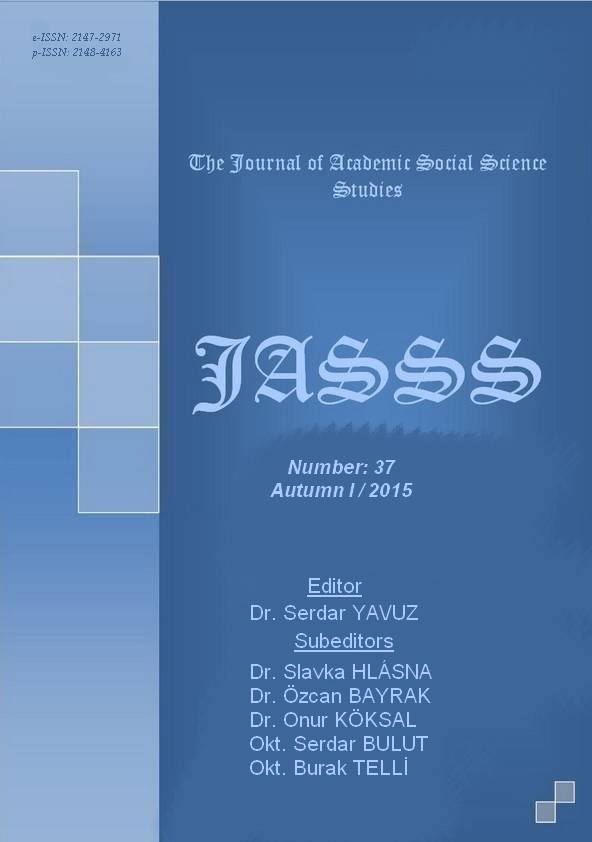BİR TURİZM İŞLETMESİ OLAN BAĞCILIK İŞLETMELERİNDE SÜRDÜRÜLEBİLİRLİK YAKLAŞIMI: TRAKYA’DA BİR ÇALIŞMA
Author :
Abstract
Turizme sadece işletmecilik boyutu açısından yaklaşıldığında, turizmin doğayı tahrip ettiği deniz-kum-güneş (d-k-g) turizmi destinasyonlarında net olarak görülmektedir. D-k-g turizminde belli bir tatmin seviyesine ulaşan turistler, “özel ilgi” temelli şekillenen yeni turizm çeşitlerine yönelmektedir. Bu turizm çeşitlerinde turizm olgusu, işletmecilik unsuru yanında coğrafya boyutu ile de ele alınmaktadır. Bu bağlamda 1970’lerden beri bir moda kavram gibi görünse de özellikle Almanca konuşulan coğrafyada, temelleri 100 yıl öncesine kadar uzanan bir anlayış karşımıza çıkmaktadır: Sürdürülebilirlik. Sürdürülebilirlik, sosyo-ekolojik, sosyo-ekonomik ve sosyo-kültürel olmak üzere üç boyutlu kabul edilmekle birlikte bu araştırmada sadece sosyo-ekolojik boyut ele alınmıştır. Bu çalışmada nitel araştırma yönteminden yararlanılarak toplamda 12 Trakya Bağ Rotası (TBR) işletmesinden sekizinin sahibi ya da işletmecisi olan toplam dokuz kişi ile derinlemesine görüşmeler geçekleştirilmiş ve elde edilen veriler betimsel analiz tekniğiyle değerlendirilmiştir. Ayrıca çalışma ile ilgili yazılı dokümanlar incelenmiştir. Trakya’da bağcılık işletmeleri ile gastronomi turizmi araştırmaları yapılırken, çalışmalar sırasında sürdürülebilirlik anlayışı ile işletmecilik yaptıkları ortaya çıkmıştır. Sürdürülebilir işletmecilik bu çalışmada sosyo-ekolojik boyutu ile; içme suyu ve atık su, katı atık, enerji üretimi, erozyon, doğal yaşama katkı ve geleceğe yönelik kaygılar alt başlıklarında ele alınmıştır. Görüşülen işletmecilerin hem sürdürülebilir yaşam tarzını benimsedikleri hem de bunu işletmelerinde uygulamaya çalıştıkları görülmekle birlikte uygulama sürecinde bazen yasal prosedürlerin henüz yeteri kadar işlevsellik kazanmadığı görülmüştür.
Keywords
Abstract
When approached in industrial terms, it is clearly observed in sea-sand-sun (s-s-s) destinations that tourism destroys the nature. Reaching a certain level of satisfaction in s-s-s tourism, the tourists turn towards new tourism types that take form on the basis of “special interests”. Along with the industrial terms, the fact of tourism is also discussed in terms of its geographical extent in these types of tourism. Although it seems like a trendy concept since the 1970s within this context, a concept appears before us, which dates back to 100 years ago especially in Germanic lands: Sustainability. Although sustainability is agreed to have three dimensions, namely socio-ecologic, socio-economic and socio-cultural, only the socio-ecologic aspect is discussed in this study. Total of nine people, who were either owner or the managers of eight out of all 12 Thracian Vineyard Route (TVR) enterprises, have been interviewed in detail in this study by using a qualitative analysis method and the data obtained have been evaluated by descriptive analysis method. Written documents regarding the study has also been reviewed. While conducting the research regarding the vineyard facilities and gastronomy tourism in Thrace, it was revealed that these entrepreneurs were adopting the notion of sustainability. In this study, sustainable entrepreneurship is discussed within the context of its socio-ecologic aspect, under the following subtitles: potable water and waste water, solid waste, energy generation, erosion, contributions to the natural life and habitat and the prudential concerns. Although it was observed that the interviewed entrepreneurs both adopted and tried to practice a sustainable lifestyle in their facilities, it was also observed that some legal procedures were not functional enough to support these efforts.





